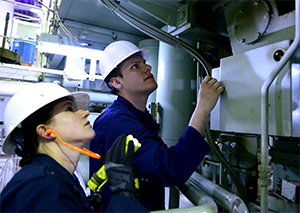The U.S. Coast Guard detained fewer foreign-flagged ships for environmental and safety-related deficiencies in 2016, with the number falling from 202 in 2015 to 103 — a five-year low.
That’s one of the positive findings in the 2016 Annual Report on Port State Control (PSC). The report provides statistics on the enforcement of regulations under the International Convention for the Safety of Life at Sea (SOLAS), the International Convention for the Prevention of Pollution from Ships (MARPOL), and the International Ship and Port Facility Security (ISPS) Code on foreign-flagged vessels trading in U.S. ports.
Less encouraging report news: The percentage of violations related to firefighting and fire protection systems rose for the third consecutive year.
“Once again, there were a significant number of required remote-operable fuel shutoff valves on various fuel and lube oil tanks disabled in the open position, which could not be operated from outside the space in the event of the fire,” the report stated. “Additionally, our (PSC officers) still find fire dampers inoperable and fire hoses that are damaged or dry rotted.” Inoperable main fire pumps were another concern.
The key to countering the trend, said Coast Guard Lt. Samuel Danus, is further encouraging ship crews to maintain the systems so that they don’t malfunction.
Danus, a PSC oversight staff officer with the Coast Guard’s Office of Commercial Compliance, also runs the QUALSHIP 21 program, which recognizes and rewards vessels that consistently adhere to compliance rules. In 2016, 1,493 vessels were enrolled in the program. With the drop in overall detentions, only one flag administration lost its eligibility, and six more — Bahamas, China, Germany, Isle of Man, Portugal and Singapore — became QS21 eligible for 2017.
Danus said he was excited for the July rollout of the QUALSHIP 21 E-Zero program. It’s getting a lot of buzz for further incentivizing strict compliance with environmental rules and commitment to environmental stewardship. E-Zero eligibility criteria include QUALSHIP 21 certification for the past three years, no worldwide MARPOL detentions for the vessel in the past three years, and installation of a Coast Guard-approved ballast water management system, or a compliance date extension letter for such a system.
“We’re looking forward to enrolling and recognizing our first group of ships that meet the criteria (for) E-Zero after July 1,” Danus said, noting that the new program focuses on international environmental conventions and U.S. ballast water regulations. Existing QS21 ships due for renewal in the coming months automatically will be screened for E-Zero eligibility.
In 2016, 9,859 vessels from 83 flag administrations made 81,877 port calls to the United States. The Coast Guard conducted 9,390 SOLAS safety exams and 8,818 ISPS exams on these vessels.
Another plus identified in the annual report: Environmental compliance is increasing, as MARPOL Annex I deficiencies declined. Danus noted, however, that these numbers tend to fluctuate. There were 387, 417 and 285 pollution-prevention and response-related deficiencies in 2014, 2015 and 2016, respectively.
During every PSC examination, the Coast Guard checks for compliance with MARPOL Annex I standards. Records show that the most egregious offenders are still at it despite repeated detentions, civil penalties and criminal prosecution. The solution, Danus explained, is to continue vigilantly following through when confronted with serious wrongdoing, such as illegal discharges and falsification of oil record books.
Danus believes programs like E-Zero offer hope for better compliance and safer ships.
“E-Zero exists because we wanted to provide an even higher level of recognition that could spur improved safety, security and pollution-prevention performance by foreign shipping,” he said.

